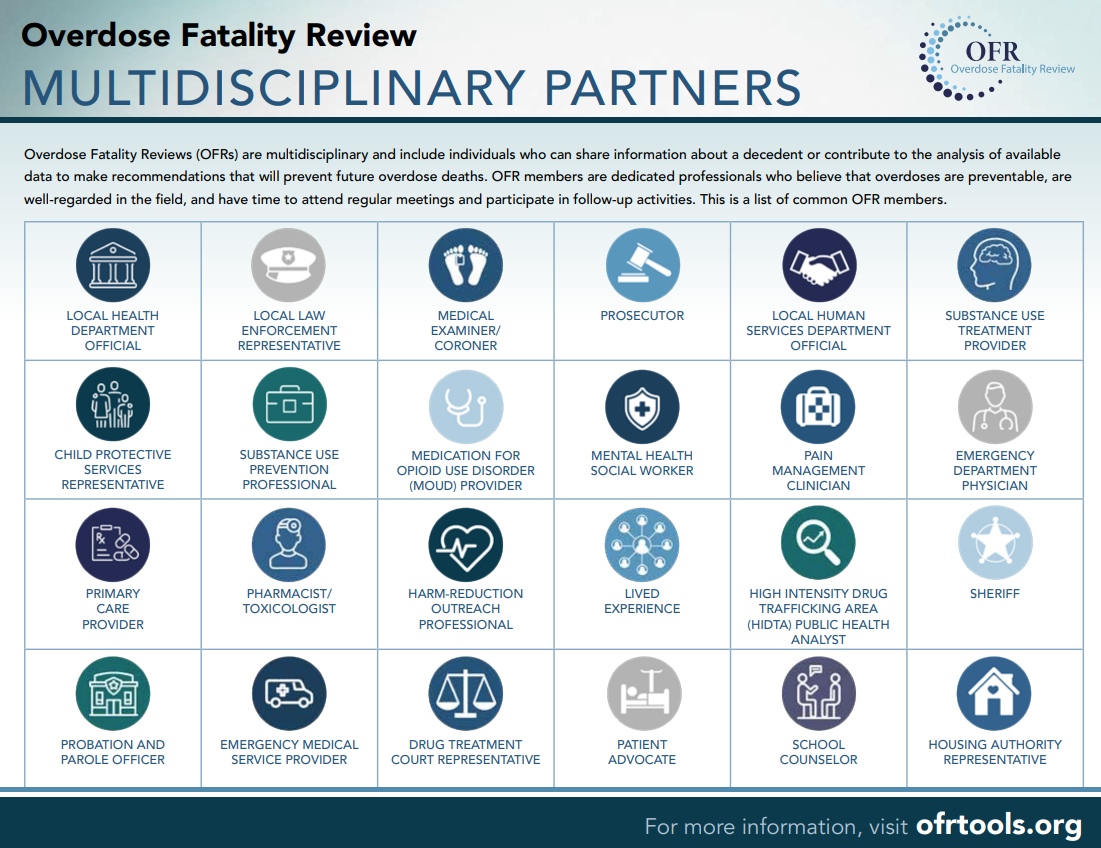OFR Practitioner's Guide Menu
Recruit Your OFR Members
This module covers the overdose fatality review (OFR) team leadership roles and members, as well as how to recruit to ensure active participation by multidisciplinary members. It also covers how the OFR team fits into a larger infrastructure, including subcommittees and a governing committee.

OFR teams are multidisciplinary and include individuals who can share information about a decedent or contribute to the analysis of available data to make recommendations that will prevent future overdose deaths.
Recruiting OFR Members
Overdoses affect a variety of populations, neighborhoods, and communities. To effectively function and work toward the goal of preventing overdose deaths, OFR teams need a diverse set of members from disciplines and sectors that represent the community.
OFR team members are dedicated professionals who believe that overdoses are preventable, are well-regarded in the field, and have time to attend regular meetings and participate in follow-up activities.

Common OFR Members
Self-Assessment Checklist
Recruit your OFR Members
Appendix
-
Sample New Member Packet
Report - 5/13/2021
This document is a sample new OFR member packet developed by the Union County Overdose Prevention & Fatality Review Coalition.
This document is a sample new OFR member packet. -
Just Partnerships to Enhance Overdose Fatality Review
Podcast - 2/19/2021
The National Violent Death Reporting System (NVDRS) is the only state-based reporting system that covers all types of violent deaths, including homicides and suicides. It pools more than 600 unique data elements from multiple sources into an anonymous, usable database. Dr. Mallory O’Brien used her experience with NVDRS to improve the overdose fatality review process.
Listen along as she discusses leveraging partnerships to enhance overdose fatality reviews, their impact on communities with substance abuse problems, and the historical context that led to fatality reviews in this episode of Just Science.
This season is in collaboration with the Bureau of Justice Assistance Comprehensive Opioid, Stimulant, and Substance Abuse Program funding to respond to illicit substance use and misuse in order to reduce overdose deaths, promote public safety, and support access to services.
This episode of Just Science is funded by the National Institute of Justice’s Forensic Technology Center of Excellence [Award 2016-MU-BX-K110].
Dr. Mallory O’Brien, Assistant Professor at the Medical College of Wisconsin, discusses how partnerships can enhance overdose fatality reviews. -
Approaching OFR Partners
Report - 1/27/2021
This document was developed by a local OFR team and summarizes the five steps that should be done to effectively recruit partners to participate in an OFR.
This resource provides steps for effectively approaching OFR partners. -
OFR Project Management Template
Report - 1/27/2021
The tool was developed by a public health analyst to assist local OFR teams in scheduling necessary steps to begin an OFR initiative. The steps and information are based on the Overdose Fatality Review: A Practitioner's Guide to Implementation.
This Gantt chart template serves as a project management implementation timeline development tool for OFR teams. -
OFR Project Management Tool Demonstration
Video - 1/27/2021
This video walks the viewer through how to modify and use the OFR Project Management Template Gantt chart.
View a video demonstrating how to use the OFR Project Management Template Gantt chart. -
OFR Project Management Tool Instructions
Report - 1/27/2021
This document walks the reader through how to modify and use the OFR Project Management Template Gantt chart.
This document explains how to use the OFR Project Management Template Gantt chart. -
Overdose Response Strategy (ORS)
Online Resource - 12/15/2020
The ORS is an unprecedented and unique collaboration between public health and public safety, created to help local communities reduce drug overdoses and save lives by sharing timely data, pertinent intelligence, and innovative strategies. The ORS is implemented by state teams made up of Drug Intelligence Officers and Public Health Analysts, who work together on drug overdose issues within and across sectors and states. By sharing information across sectors, the ORS is growing the body of evidence related to early warning signs and prevention strategies. With the information shared, and programs inspired by the ORS, the program is helping communities and individuals make healthier, safer choices. The mission of the ORS is to help communities reduce fatal and non-fatal drug overdoses by connecting public health and public safety agencies, sharing information, and supporting evidence-based interventions.
The ORS is a public health/safety collaboration between the Centers for Disease Control and Prevention and 21 High Intensity Drug Trafficking Areas. -
Opioid Fatality Review Boards: State Laws
Report - 12/10/2020
Some states have legislation to support OFR. Knowing what states have state statute supporting OFR and what it entails is useful to OFR teams within these states. It can also be useful to states without OFR statute to reference in the development of their own statute(s). This report was developed by Legislative Analysis and Public Policy Association (LAPPA).
This document summarizes state laws related to overdose fatality review (OFR). -
Overdose Response Strategy (ORS) Program Overview
Sample - 9/20/2020
The ORS was created to help local communities reduce drug overdoses and save lives by sharing timely data, pertinent intelligence, and innovative strategies. The mission of the ORS is to help communities reduce fatal and non-fatal drug overdoses by connecting public health and public safety agencies, sharing information, and supporting evidence-based interventions.
The Overdose Response Strategy (ORS) is an unprecedented and unique collaboration between public health and public safety. -
Overdose Fatality Review Teams: Partnerships with PDMPs
Webinar - 8/11/2020
Also included in the webinar are the topics of challenges of participating and sharing data and how the challenges may be overcome and a discussion of how PDMP programs may build a relationship with their local OFRs.
This webinar highlights OFRs and the benefits of OFR and PDMP partnerships. -
Sample: OFR Recruiting Letter
Sample - 7/22/2020
Sample letter text that may be used to recruit new OFR members.
Sample: OFR Recruiting Letter -
Sample Checklist: OFR Launch
Sample - 7/21/2020
List of activities that need to be accomplish before launching and convening an OFR.
Sample Checklist: OFR Launch





